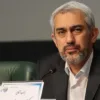Iranian authorities on Wednesday executed a man convicted of spying for Israel’s Mossad intelligence agency, the country’s judiciary announced.
According to Mizan Online, the judiciary’s official news platform, Babak Shahbazi was hanged after Iran’s Supreme Court upheld his death sentence, following what officials described as “due legal process.”
Shahbazi had reportedly been working with the Mossad since 2022, though the exact date of his arrest was not disclosed.
He was convicted of the capital offences of “corruption on earth” and “waging war against God”, charges often levelled in Iran against individuals accused of serious national security offenses.
The judiciary said Shahbazi was involved in the design and installation of industrial cooling systems for companies tied to Iran’s military, intelligence, and telecommunications sectors. This access allegedly enabled him to collect and pass sensitive information to Israeli intelligence in exchange for money and foreign residency.
The execution is part of a broader crackdown on alleged espionage activities, which has intensified following the escalation of hostilities between Iran and Israel earlier this year.
In August, Iranian authorities executed Roozbeh Vadi, an employee at a subsidiary of the Atomic Energy Organization of Iran, after he was convicted of leaking classified data on Iranian nuclear scientists and facilities to Mossad.
In July, Iran’s intelligence ministry announced the arrest of 20 individuals allegedly linked to Mossad, including operational and support agents, across Tehran and multiple provinces.
Iran and Israel have been long-standing regional adversaries, and Tehran routinely accuses Tel Aviv of running espionage and sabotage operations on Iranian soil.
According to rights groups, including Amnesty International, Iran remains the world’s second-highest executioner after China, frequently drawing international condemnation for its use of the death penalty, especially in politically sensitive cases.
AFP


